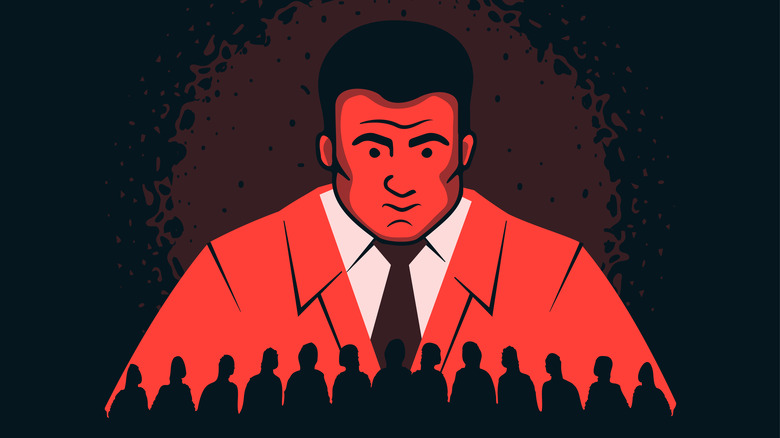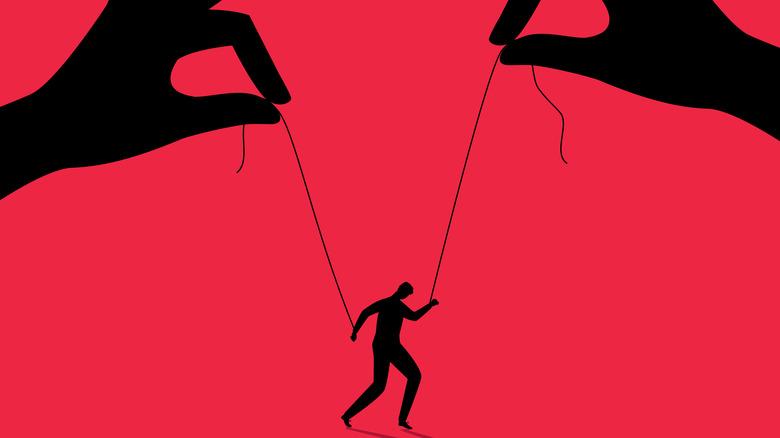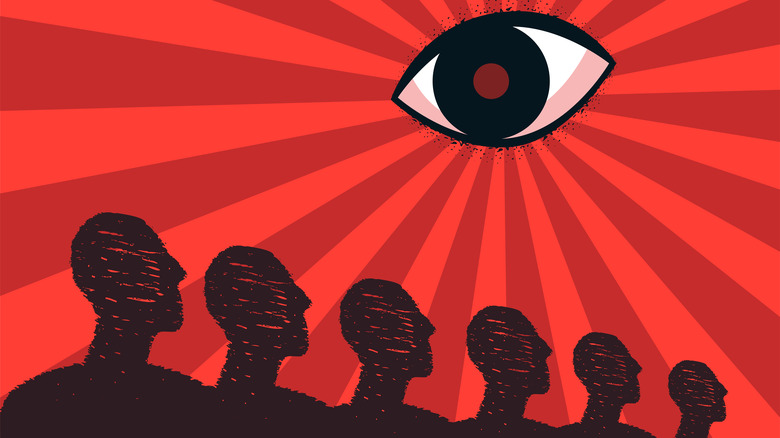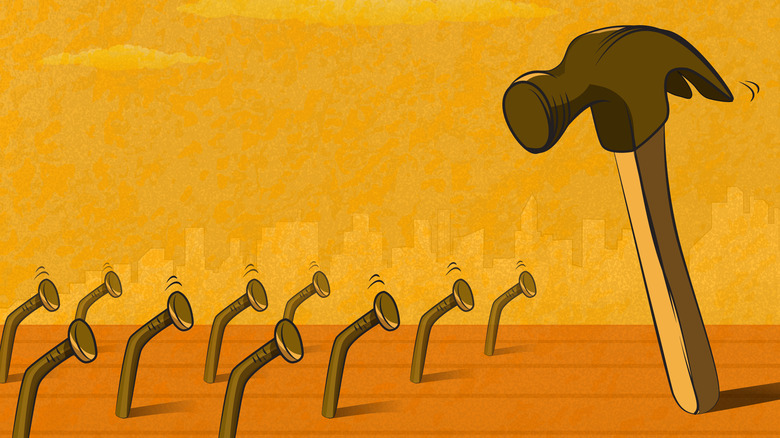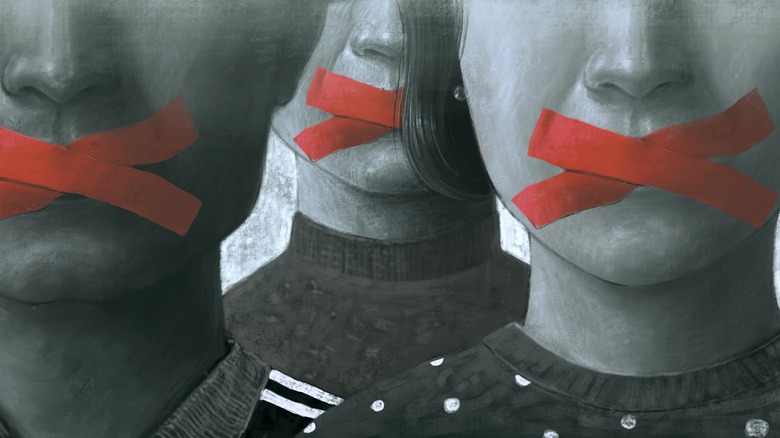The Psychology Behind Why People Admire Dictators
He steps up to the podium ranting, thrashing his hands around, and denouncing enemies of the people. He's loud, feverish, deluded at best, and a raving lunatic at worst. He's petty, hateful, a blindly one-sided moralizer, and a peddler of narrow solutions to broadly-caused social ills. In the end, he sculpts a land of ruthless and inflexible laws that incur practical enslavement. And yet people love him. They admire and extol him. They worship him and weep for his presence. He's a dictator, one of an endless string throughout human history. Some few detest him and wish for his death, but many others lionize and adore not only him but all he represents.
Contrary to being an unlikely or even uncommon occurrence, the above scenario is all too common. The 20th century alone saw a landslide of dictators, as sites like Live Science illustrate. Big, recognizable names include Germany's Adolf Hitler, Italy's Benito Mussolini, the U.S.S.R.'s Joseph Stalin, China's Mao Zedong, Vietnam's Ho Chi Minh, and Cambodia's Pol Pot. Dictators sprouted up across the globe in Europe and Eurasia (Romania's Nicolae Ceauşescu, Turkmenistan's Gurbanguly Berdymukhamedov), the Middle East (Syria's Bashar as-Assad, Iraq's Saddam Hussein), Africa (Libya's Muammar Gaddafi, Egypt's Hosni Mubarak) and Latin and South America (Cuba's Fidel Castro, Chile's Augusto Pinochet). These individuals represent the barest handful of dozens, each with a rise to power underpinned by a host of unique circumstances, and each sharing common characteristics. And admirers of dictators? They share common characteristics, as well.
1 person, absolute power
A dictator is a single ruler with absolute, unquestioned power and authority. A dictator can define laws and punishments, come to all major and minor governmental and military decisions, and is often associated with brutal, murderous tendencies towards one's own populace. But a dictator need not seize power illegally. As Deutsche Welle explains, Adolf Hitler's Nazi party won legal elections in 1932 through simple majority votes. Vladimir Putin won a democratic election in 2000 to become president of Russia. Dictators sometimes twist the law into their favor after coming to legitimate power and are cheered along the way, per the Renew Democracy Initiative.
In case you doubt that folks admire dictators, think of figures like the Macedonian king Alexander the Great (356 to 323 B.C.E). Historians and non-historians alike shower him with godlike accolades, as Military History shows. And yet, he butchered thousands of people during his conquests, even entire tribes, per History Net. Similarly, the Romans loved Julius Caesar, a man who decreed himself "dictator perpetuus" (dictator in perpetuity) after professing to have killed nearly 2 million people during his military campaigns, as World History Encyclopedia cites.
So why the worship of strongmen, tyrants, and autocrats? Is it state propaganda stirred with the rapture of tribal victory? Is it simple susceptibility to demagoguery? Or is it a public sham masking the fear of reprisal from the ape with the biggest club?
The promise of safety
Taking a look at a dictator like Adolf Hitler, we can see that he didn't come to power incidentally. There were specific social, cultural, economic, etc., conditions that allowed him to become German chancellor in 1933. Germany had suffered a demoralizing defeat in World War I, and their economy was in ruins. They had to pay billions in reparations, which caused inflation to go through the roof. As the National World War II Museum says, people need a literal wheelbarrow full of money to buy a single loaf of bread. The Nazi party stepped into this environment of desperation, need, and fear promising renewed power, hope, and purpose for the German people.
Such events depict a chief reason why people give themselves over to governmental tyranny and authoritarianism: fear. The desire for authority, as Aeon describes, is a reflection of the fear of the loss of control and safety. If people are afraid enough, they might follow a dictator even at the cost of rights and freedoms. The veneer of civilization need only slip enough to reveal exactly how vulnerable we are to disease, pain, and suffering. In a Freudian sense, this means reverting to an "infantile prototype," a childlike state where the dictator adopts the role of a parent. Psychology Today echoes this sentiment, saying that the rise of a dictator goes hand-in-hand with the loss of responsibility for oneself and one's actions. It's like being a wallflower to the consequences of one's own actions.
Commune with the divine
On Mansu Hill in Pyongyang, North Korea stands two colossal, 65-foot-tall statues. North Koreans walk up to the statues with their arms held to their sides and bow in rows, as Atlas Obscura says. They leave flowers at the statues' feet amidst sentiments of heart-swelling, holy fervor. The statues depict North Korean leaders Kim Il-sung and Kim Jong-il, incarnate after death and sweeping benign, broad smiles over legions of worshipping citizens. Meanwhile, North Korea — officially and ironically named the Democratic People's Republic of Korea (DPRK) — remains one of the world's worst human rights offenders, as Amnesty International describes. State dominance is absolute and its censorship Orwellian. Forced labor camps abound. Basic food, water, and sanitation is lacking. And at the center of the nation is its cult of personality orbiting the Kim family, now in its third generation under Kim Jong-un.
So stands another reason why people affix themselves to dictators: religiosity. As Aeon says, a dictator is not just a political leader, but a golden idol. People don't just listen to dictators, they throw themselves prostrate. Dictators prey upon religious impulses — our oldest delusions, as Sigmund Freud said — by crafting secular cults around themselves, replete with iconography and rituals reminiscent of religious ceremonies. People transform the leader into a "protective deity" capable of fulfilling the function of gods and providing the rewards of an afterlife. Such rituals resolve a fundamental, childhood-birthed desire for a strong, idealized parental figure, as Psychology Today concludes.
Conformity and groupthink
Because it makes for such a perfect example, we can turn back to post-World War I Germany for another reason why people admire dictators. Germany's short-lived attempt at a democratic government, the Weiner Republic, lasted only from 1918 to 1933. Amidst deteriorating economic and social conditions, the Renew Democracy Initiative describes an environment of tribalism, political polarization, radical groups, self-victimization, vindictiveness, social scapegoating, and the transformation of one group into an "evil force." Eventually, as the Anne Frank House says, these sentiments gave rise to what's dubbed the "stab-in-the-back" myth, that all of Germany's woes came ever so simply down to one group: Jews.
In that kind of environment, which group would a citizen prefer to be a part of? Certainly not the ostracized group. Dictators, in other words, are like the top dog of a clique that everyone wants to get behind, as Psychology Today describes. Being aligned with the dictator means being in the dominant power group rather than the persecuted group. And like any social group, there is tremendous pressure exerted on members of the group. Very Well Mind very tellingly explains that conformity increases amongst groups when certain members of the group have high social status and power, and when there are more members of the group overall (like an entire political party or nation). This may be why dictators like Pol Pot tried to obliterate the family unit and replace it with the Cambodian communist party, per the Cambodia Tribunal.
Speaking out about the signs
Psychology Today outlines several other reasons why people cling to dictators. There's the very disheartening and atavistic follow-the-peacock-with-the-brightest-feathers human tendency, the same type that attracts people to glamorous, glitzy celebrities leading lives of perceived high social status. Then there's the highly disturbing "admiration of transgressive behavior" tendency, the type that leads people to admire the violent, cruel, and criminal because it allows them to vicariously live out fantasies of defying social norms. On the other hand, some people follow dictators out of naivety, because they assume the best in people when they ought to be more skeptical and rational.
That last point brings us to the final reason why folks admire dictators: lack of knowledge and/or critical reasoning. This doesn't mean that only a PhD candidate can spot the dangers of a rising demagogue, but rather if the populace is informed by history — and not distracted by rhetoric, disinformation, and shiny media baubles — they're better equipped to recognize the hallmarks of a dictator. This can be taken as a good thing, because out of all the reasons in this article that people follow dictators, the tendency to engage in shallow thinking is one of the more easily rectified. As Freedom House points out, it's not alarmist or incorrect to say that there's been a net rise in global authoritarian regimes over the past 15-plus years. Best keep an eye out and speak out, lest you be silenced for good.
